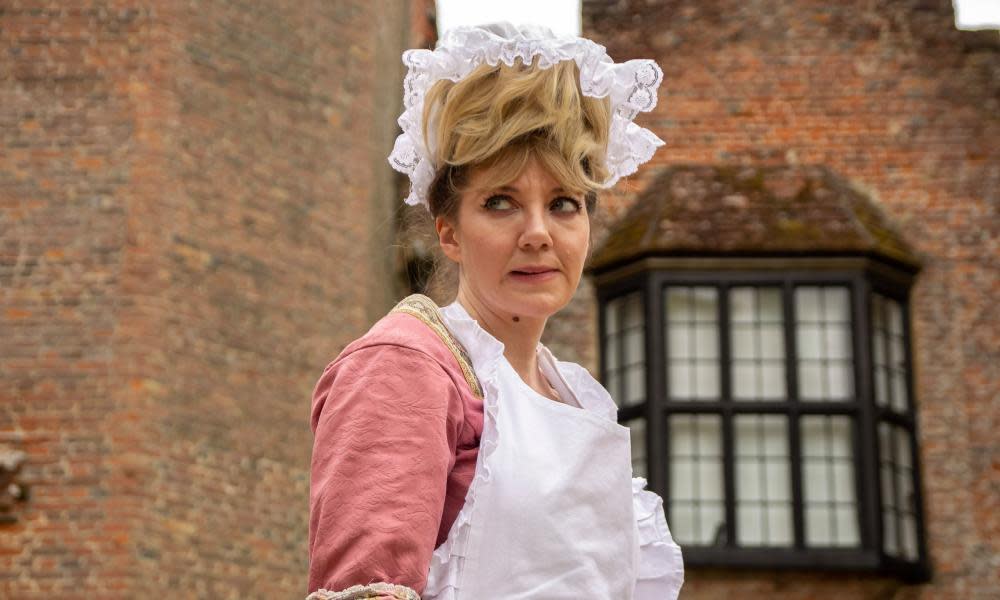Mandy review – slap my bum and call me a satanist! Diane Morgan is back

Caroline Aherne is fused with Bet Lynch for the return of Morgan’s astoundingly odd sitcom that doesn’t believe in character development
There is an intern inside Diane Morgan’s beehive. The person, after being shrunk to fit, operates a tiny control panel to create Morgan’s facial expressions. The only problem is that they are not very good at it. Perhaps the hairspray Morgan wears for her role in Mandy (BBC Two) has clouded the intern’s brain. They keep pulling on the lever that twitches her pursed lips into a lop-sided smirk, or using the rotator ball to make her Marty Feldman-like eyes swivel in a parody of human sarcasm.
Or at least, this is my explanation for why Morgan’s performance as the titular mardy, functionally unemployable Lancastrian tends towards the two-dimensional. It not only accounts for why Mandy is obsessively focused on keeping her hairdo in place. It also explains why there is not the remotest hint that Mandy’s character will develop.
She looks like a homage to Coronation Street’s Bet Lynch, with her heels and hatchet glares, but has none of Bet’s rounded humanity or narrative arc. She more closely resembles other Lancastrian comic ciphers such as Twinkle in Dinnerladies (played by Morgan’s friend and fellow Boltonian Maxine Peake), who was forever subverting her boss’s patriarchal mind games with lines including: “All right, keep your scrotum on.” Or Caroline Aherne’s checkout girl in The Fast Show, deriding shoppers’ purchases: “Parmesan cheese? Smells like a tramp’s crotch.”
The twist here is that Mandy is neither an ancillary character nor delivering a gag in a weekly sketch, but rather intended to carry the series. You might think that Morgan’s character should seem to involve more than being manipulated from within her hair by a tiny, undertrained intern. But that is to miss the magnificence of Mandy.
In a sense, this is a revolutionary sitcom, dedicated to the philosophy that people don’t really change and that richly developed narratives aren’t all that. There is an episode of Seinfeld in which Kramer test-drives a car to see how far he can go without putting in more gas. Mandy is like that: how far can she go with zero character development and only the most threadbare storylines? Not as far as season three, I would guess, but I have been wrong before.
In this episode, the season two premiere, Mandy is sent by jobcentre lackeys to work at a stately home. Her previous jobs all ended in disaster: there were fatalities after she ineptly processed fruit at a banana plant, and she saw an alien in the aisles while working in Co-op, where she racked up a £79 bill for edam after wilfully misinterpreting the staff discount.
At Brampton Hall, Mandy dresses as a scullery maid and takes visitors on tours exploring the house’s past. “This is the room where John the Baptist died,” she explains to sceptical couples in jumpers. It is as if Lucy Worsley turned up for a TV documentary gig in period costume but knew nothing about history and decided brazenly to invent nonsensical claims on the fly, staring dead-eyed at anyone who doubted her. Offered folding money by some dimwit tourist, she reveals more of the house’s history: “Ronnie and Reggie used to live here, but were killed because they stole Michael Heseltine’s ashtray.”
Mandy, then, is the soul sister of Philomena Cunk, the gormless know-nothing pundit created by Charlie Brooker and performed by Morgan. She is also closely related to Liz – whom Morgan plays in Motherland – a woman heroically scathing about the middle-class pieties of child rearing.
Later, Mandy is tasked with serving nibbles at a book reading in the hall, but she takes the vol-au-vent tray to the wrong room and finds herself among satanists conducting a black mass. That furious clattering noise you can hear is National Trust and English Heritage press officers typing statements distancing themselves from Brampton Hall’s employment practices and room-hire policies.
Long story short, Mandy is strapped to an altar by masked yet unacceptably naked satanists and rescued only when Lola, her designated-driver mate, shows up. “What the devil is going on here?” Lola exclaims. “My badminton got cancelled,” says one devil worshipper. Then Lola smacks the men’s bare buttocks (the biggest laugh of the episode, in my book) and chases them off. Why satanic ritual requires nudity is beyond me.
The episode ends with two revelations. The first I won’t disclose, but if you can’t guess the identity of at least one satanist, you are too dim to be watching Mandy. The second is more astounding. According to the credits, the show was written and directed by Morgan – not by a homunculus inside a hairdo. I would never have guessed.

 Yahoo News
Yahoo News 
